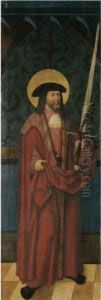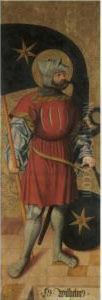Weckmann Niklaus Paintings
Niklaus Weckmann, also spelled Nikolaus Weckmann, was a prominent German composer and organist of the Baroque era, born in 1621 in Niederdorla, Thuringia, in the Holy Roman Empire. Not to be confused with the sculptor of a similar name from an earlier period, Weckmann's life was deeply intertwined with the rich musical traditions of seventeenth-century Germany, a period that witnessed the flourishing of the Baroque style across Europe. His contributions to the development of keyboard and church music during this time are noteworthy, although his work and influence are often overshadowed by his contemporaries such as Heinrich Schütz, with whom he had a significant connection.
Weckmann's musical education began early, showing prodigious talent that led him to become a pupil of Heinrich Schütz, the most distinguished German composer before Johann Sebastian Bach. Under Schütz's guidance at the Dresden court, Weckmann was exposed to the latest Italian and German styles, which greatly influenced his compositional techniques. This period was crucial for the young musician, as it not only honed his skills but also embedded in him a deep understanding of the expressive possibilities of music, which would characterize his later works.
In 1637, Weckmann continued his studies in Hamburg, where he worked with Jacob Praetorius at the famous Petrikirche. This experience further expanded his musical outlook, especially in organ playing and composition. His tenure in Hamburg was marked by significant accomplishments, notably his contribution to the development of the organ prelude and the sacred concerto, genres that were central to the Lutheran liturgical tradition.
After his studies, Weckmann served in various prestigious positions, including at the Dresden court and in Hamburg, where he eventually became the organist at the Jakobikirche, one of the city's principal churches. In this capacity, Weckmann played a pivotal role in the musical life of Hamburg, organizing concerts and musical gatherings that were among the earliest forms of public concerts in Germany. These events not only showcased his compositions but also introduced the public to the works of other contemporary composers.
Weckmann's compositional style reflects the transition from the early to the late Baroque period. His works, which include cantatas, keyboard music, and chamber works, are characterized by their emotional depth, intricate counterpoint, and the innovative use of orchestral and vocal coloring. Despite the high quality of his music, much of Weckmann's work was forgotten after his death in 1674, and only a portion has survived to the present day.
In recent years, there has been a renewed interest in Weckmann's music, with performances and recordings bringing his contributions to a wider audience. As a result, Niklaus Weckmann is beginning to be recognized as an important figure in the Baroque musical landscape, whose work offers valuable insights into the evolution of seventeenth-century German music.

